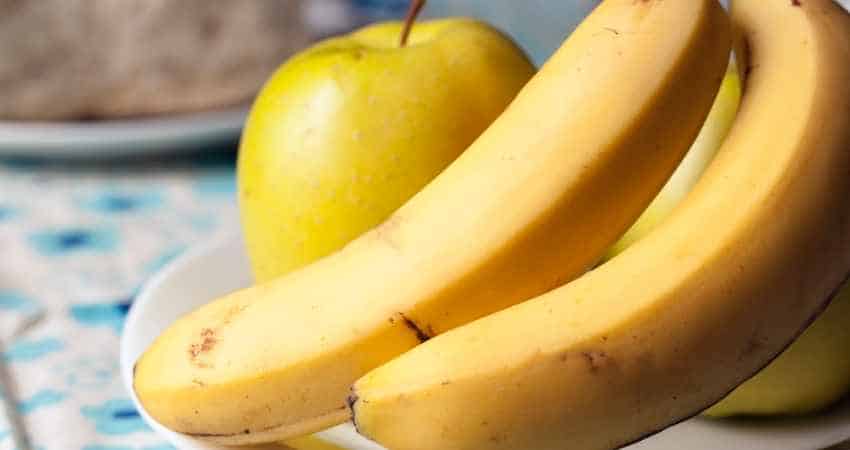Can Bananas And Apples Be Stored Together?
You may have noticed certain fruits don’t stay fresh for very long if stored with other fruits. Therefore, can you store bananas and apples together?
Bananas and apples should not be stored together. They both produce a lot of ethylene gas which causes fruits to ripen faster. Bananas and apples will quickly go bad when stored together because of the ethylene gas they both produce. They should be stored separately to ensure they stay edible for as long as possible.
Let’s take a deeper look at why they should not be stored together. In addition, some storage solutions to keep them separate and long-lasting.
Why Bananas And Apples Should Not Be Stored Together
As a Certified Health Coach many clients ask me about storing fruit including apples and bananas. Also, I purchase and consume them every day. Therefore, I have researched this topic in the past and present. Let’s examine the storage methods closely.
Bananas and apples should not be stored in close proximity without a barrier because they are both fruits that ripen quickly.
The speed at which these fruits ripen is due to the fact that both fruits naturally produce a large amount of ethylene gas ((Fruits & Veggies For Better Health: Certain Fruits and Vegetables Should Not Be Stored Together?)).
This gas is harmless and impossible to detect, but it is one of the factors that cause the fruit to ripen quickly.
If ethylene producing fruits are stored together, the ethylene gas each one produces, fills the environment around the fruit more quickly. This drastically increases the rate at which the fruit ripens.
This can lead to the fruit over-ripening and going rotten in very short amounts of time compared to other fruits. This renders the fruit unusable.

What Is Ethylene And How Does It Affect Your Fruit?
Ethylene is a natural hydrocarbon gas produced by every fruit and fruit plant that aids in the ripening of the fruit ((National Center for Biotechnology Information: Ethylene detection in fruit supply chains)).
This naturally occurring, harmless gas causes the fruit to soften and sweeten over time. This makes the fruit better tasting, easier to eat and easier for your digestive system. It allows it to digest and absorb all of the important nutrients locked away within the fruit itself.
Some fruits stop producing ethylene gas after they have been removed from their plant or tree. Bananas and apples are both climacteric fruits, which means they produce significantly more ethylene gas as they ripen while off of their tree ((San Diego Center for Community Health: Ethylene in Fruits and Vegetables)).
This means bananas and apples will ripen faster once they are harvested. In addition, they will ripen faster and faster as they remain uneaten in your fruit bowl until they over-ripen and go bad.
Ethylene production can be slowed down by keeping the fruit in an environment with cold temperatures, above freezing, like your refrigerator.
In addition, the fruit will last longer if they are unstored together. The more ethylene gas present in the air around the fruit, the more quickly it will go bad. Therefore, keeping climacteric fruits separate from each other will help to prolong their shelf-life.
How To Store Bananas And Apples To Keep Them Fresh
The most simple and effective way to prevent your bananas and apples from ripening too quickly is to keep them cold.
Have you ever wondered why the fruit market is always so chilly? Keeping the fruits cold but not frozen will reduce the amount of ethylene gas the fruit produces.
The gas is the main culprit for over-ripe fruit. Therefore limiting the amount it produces is one of the best ways to keep the fruit fresh and ready to eat for extended periods.
Another way to limit the amount of ethylene fruits produce and release into the air is to keep them contained within a sealed plastic bag. A plastic bag, along with a cold environment, will go a long way to keeping your fruit good for eating.
If possible, it’s best to keep your bananas and apples stored separately.

Storing Bananas And Apples Separately
Storing bananas and apples separately does not have to be as inconvenient as it sounds. If they must be stored together, both of them can be stored in plastic bags.
Keeping them in plastic bags means they will not disperse the ethylene throughout their surrounding environment. The gas will remain localized around the fruit within the bag.
This means you can store both bananas and apples together in the same refrigerator. Make sure they’re kept in their own sealed plastic bags. Ziplock bags are a good option for storing these fruits. If possible, store them out of bags in separate compartments ((Seattle.gov: Fruit & Vegetable Storage Guide)).
The better option is to store one of the fruit types in the fridge and the other outside of the fridge. Apples tend to last longer than bananas do, so leave them out and available in the kitchen, while keeping your bananas stored in the fridge. In the fridge, keep them in the crisper drawer so they last longer ((USDA: Refrigeration and Food safety)).
Keeping the apples in the fridge and the bananas out will ensure the apples last longer, even though the bananas will ripen quickly outside of the fridge.
Keeping one in the fridge and the other out of the fridge, means the fruit kept in the fridge will take longer to ripen. This means you can stagger the fruit you eat and do not have to eat it all at once.
Storing Bananas
If you store bananas outside of the fridge, wrap a plastic bag or some plastic wrap around the stem of the bananas. This is where much of the ethylene gas is produced and escapes from. By keeping this part of the banana isolated from the rest, will help them to stay fresh for longer.
Alternatively, to help maintain the freshness of your bananas, separate them from each other instead of keeping them all in one bunch attached to one stem.
Keeping them in the fridge will allow them to stay fresh longer although it’s not advisable. The skin will turn black but inside it stays fresh ((Montana State University: Bananas)). Bananas prefer temperatures around 50 degrees Fahrenheit1.
If bananas are kept together as one bunch, they will all ripen together due to the ethylene they produce. If you separate them, they may ripen at a different pace from each other. This will enable you to enjoy your bananas for longer.
Are you using organic or regular bananas? This may affect your decision on how you store them. You can read my blog post by clicking right here, This is the Difference Between Organic and Regular Bananas.
Here’s a video about how to store bananas.
Storing Apples
Apples can be stored for up to a year if they are kept in the right conditions. Their waxy skin helps keep their own moisture in and helps to prevent outside influences like dry air from affecting the fruit itself.
For maximum longevity, keep them in a very cool environment like the refrigerator2. Do not let the apples freeze. Keeping them at temperatures just above freezing will keep them fresher for longer periods3.
Apples will fare quite well if they are kept outside of the fridge as well but don’t let your apples get too warm. The amount of fruit-ripening ethylene they produce will sky-rocket, and they will over-ripen very quickly.
If you have any questions to ask me about this article don’t hesitate to comment below or email us. You can find an email on our contact page.
Read Next – More Food Storage and Apple Articles
Empire vs Red Delicious Apples: The Ultimate Comparison
Fuji vs. Gala Apples – A Complete Comparison
Gala Vs Empire Apples – The Differences
Fuji Apple vs McIntosh – What’s The Difference?
3 Steps To Preserving Kiwi Fruit
4 Ways To Tell If A Papaya Has Ripened
- Fruits and Veggies for Better Health: Banana [↩]
- Purdue University Cooperative Extension: Home Storage of Apples [↩]
- Nebraska Extension: Storing Fresh Fruits and Vegetables [↩]
